MercoPress. South Atlantic News Agency
Tag: Venezuelan National Assembly
-
Tuesday, February 5th 2019 - 08:58 UTC
Latin American countries call on Venezuelan military to support interim president Juan Guaidó
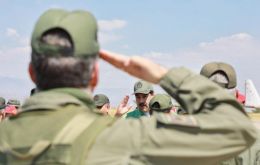
A group of Latin American countries and Canada has urged the Venezuelan military to support opposition leader Juan Guaidó as interim president. In a statement, 11 of the 14 members of the Lima Group called for a change of power without the use of force and the urgent delivery of humanitarian aid.
-
Friday, February 1st 2019 - 10:20 UTC
Guaidó invites Russia and China to change sides: “your interests will be best served”
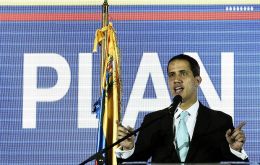
Global jostling intensified on Thursday between countries that want Venezuelan President Nicolas Maduro in power and those trying to force him to resign, as opposition leader Juan Guaidó made overtures to his rival’s allies Russia and China.
-
Wednesday, January 30th 2019 - 20:55 UTC
Venezuela: Socialist International recognizes Guaidó and calls Maduro “illegitimate”
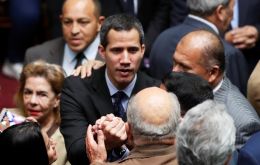
The Council of the Socialist International (SI) approved a communique on Tuesday where they recognize deputy Juan Guaidó and the Venezuelan National Assembly as the only legitimate power of leading a process of democratic transition in Venezuela.
-
Friday, January 25th 2019 - 10:15 UTC
Russia, China and Turkey in support for Maduro as they warn Washington not to intervene
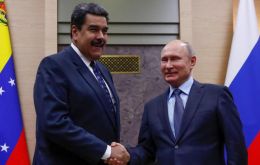
Russia on Thursday accused the United States of trying to usurp power in Venezuela and warned against a military intervention by confronting Washington and the European Union, which backed protests against one of Moscow's closest allies, Venezuelan partial recognized President Nicolás Maduro.
-
Thursday, January 24th 2019 - 06:04 UTC
Who is Juan Guaido?, proclaimed by the opposition as Venezuelan acting president
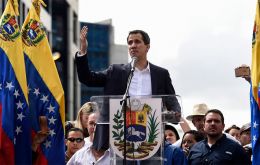
Juan Guaido has declared himself president of Venezuela — a move quickly endorsed by several Latin American countries, as well as Canada and the United States. Just two months ago, many people around the world, and even inside Venezuela, may not have known Guaido's name.
-
Tuesday, January 22nd 2019 - 08:37 UTC
Venezuela foils uprising by National Guardsmen; massive protest march announced for Wednesday
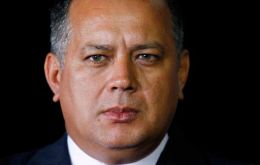
Venezuela plunged deeper into turmoil Monday as security forces put down a pre-dawn uprising by National Guardsmen that triggered violent street protests, and the Supreme Court moved to undercut the opposition-controlled congress' defiant new leadership. Socialist party chief Diosdado Cabello said 27 guardsmen were arrested and more could be detained as the investigation unfolds.
-
Friday, January 18th 2019 - 09:30 UTC
Brazilian government meets Venezuelan opposition leaders to discuss Maduro's “illegitimacy”

Brazilian and US officials met Venezuelan opposition leaders in Brasilia on Thursday to discuss the political crisis in the oil-rich country ruled by president Nicolas Maduro, Brazil's foreign ministry reported.
-
Tuesday, January 15th 2019 - 09:20 UTC
The salary is tripled in Venezuela: Increases to 6 dollars

Nicolás Maduro ordered an increase of 300% of the minimum wage on Monday, the 26th time he makes an announcement of this kind during his term. Also, an increase in the petro cryptocurrency was decreed and the president highlighted the economic management of his government, which he said in his annual report helped to turn Venezuela into the country with “greater socioeconomic equality”.
-
Monday, January 14th 2019 - 18:06 UTC
Uruguay: “Deep concern” about detention of the Venezuelan Parliament president
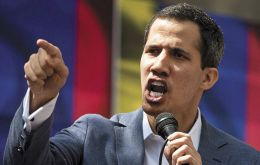
The Ministry of Foreign Affairs expressed on Monday, through a statement, its “deep concern” regarding the “serious institutional crisis” and the “acts of intimidation” that led to the arrest and subsequent release of the president of the National Assembly of Venezuela, Juan Guaidó , by officials of the Bolivarian National Intelligence Service (Sebin).
-
Monday, January 14th 2019 - 00:50 UTC
Detention of the Venezuelan Parliament President shows the “rupture” in the Maduro regime

Officials of the Bolivarian Service of National Intelligence (Sebin) retained the deputy Juan Guaidó, President of the National Assembly (AN) and Venezuela’s President-in-charge, when he was going to an open Parliament hall in the north of the country. Minutes later, the parliamentarian was released and attended to the event with a wounded hand and ensuring that the Armed Forces do not want Nicolás Maduro, president considered “de facto” by the Parliament and part of the international community.
